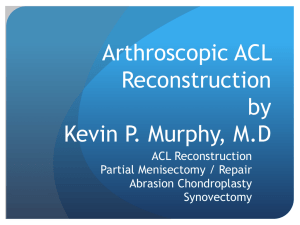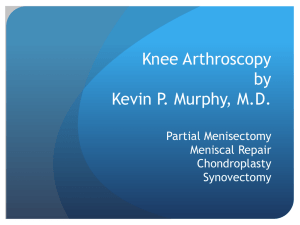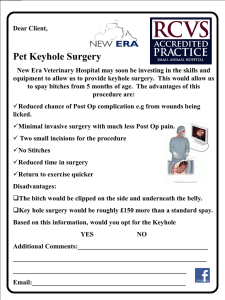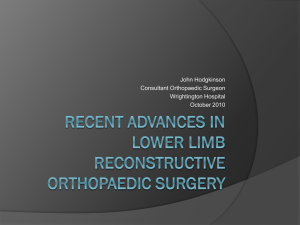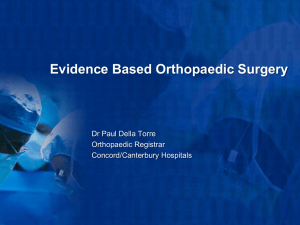TOTAL KNEE INFORMATION - Main Line Orthopaedics PC
advertisement
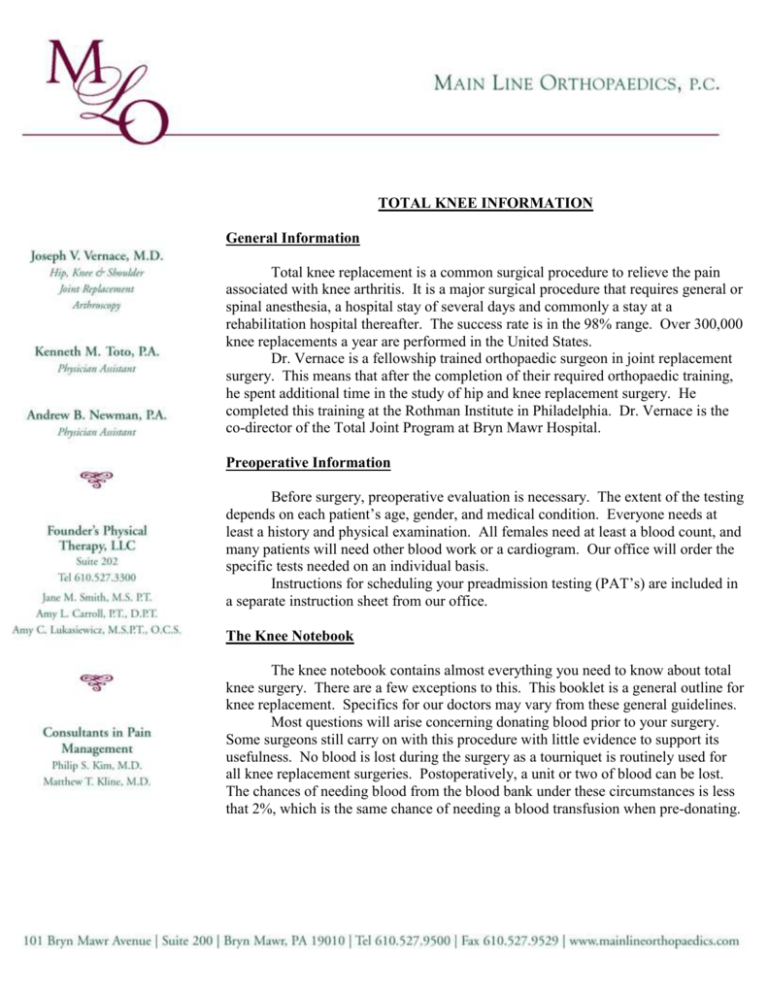
TOTAL KNEE INFORMATION General Information Total knee replacement is a common surgical procedure to relieve the pain associated with knee arthritis. It is a major surgical procedure that requires general or spinal anesthesia, a hospital stay of several days and commonly a stay at a rehabilitation hospital thereafter. The success rate is in the 98% range. Over 300,000 knee replacements a year are performed in the United States. Dr. Vernace is a fellowship trained orthopaedic surgeon in joint replacement surgery. This means that after the completion of their required orthopaedic training, he spent additional time in the study of hip and knee replacement surgery. He completed this training at the Rothman Institute in Philadelphia. Dr. Vernace is the co-director of the Total Joint Program at Bryn Mawr Hospital. Preoperative Information Before surgery, preoperative evaluation is necessary. The extent of the testing depends on each patient’s age, gender, and medical condition. Everyone needs at least a history and physical examination. All females need at least a blood count, and many patients will need other blood work or a cardiogram. Our office will order the specific tests needed on an individual basis. Instructions for scheduling your preadmission testing (PAT’s) are included in a separate instruction sheet from our office. The Knee Notebook The knee notebook contains almost everything you need to know about total knee surgery. There are a few exceptions to this. This booklet is a general outline for knee replacement. Specifics for our doctors may vary from these general guidelines. Most questions will arise concerning donating blood prior to your surgery. Some surgeons still carry on with this procedure with little evidence to support its usefulness. No blood is lost during the surgery as a tourniquet is routinely used for all knee replacement surgeries. Postoperatively, a unit or two of blood can be lost. The chances of needing blood from the blood bank under these circumstances is less that 2%, which is the same chance of needing a blood transfusion when pre-donating. What is a Total Knee Replacement? As shown to you during your office visit, the cartilage cushion on the ends of the bones has worn out and there is now no smooth space between the bone ends. This results in rough surfaces scraping and rubbing against each other causing your arthritic pain. In addition, because the wear is usually uneven, the knee joint, in many cases, begins to bow and curve, resulting in an abnormal shape to your lower leg (bow-legged or knock-kneed). Total knee surgery relieves the pain by resurfacing the ends of the bones with smooth metal and plastic. In addition, the ligaments are rebalanced, resulting in straightening of your leg during the surgery. The surgery is done through an incision in the front of your knee. The length of the incision varies with the size of the knee but is generally about 4 to 5 inches in length. During the surgery, the worn ends of the bones are removed and replaced with the three parts of the knee prosthesis. The kneecap portion (patella) is a small button made of durable plastic. The top surface of your shinbone is covered with the tibial component. This is a smooth flat metal tray, which is covered with smooth plastic like the undersurface of the kneecap. This large piece of plastic functions as your “new cartilage”. The end of the thigh bone (femur) is capped with a strong metal piece known as the femoral component. All the parts come in various sizes so that each prosthesis can be customized to fit your needs, insuring maximum stability and range of motion. When put together, these new surfaces rub together providing smooth, pain-free motion. Custom Fit Total Knee Replacement You can obtain information about our newest technique for total knees in our office brochure describing this technique, or you can go to our website at www.customfittotalknee.com. Dr. Vernace was the second surgeon in the country and the first on the east coast to perform this surgery. The precise fit that is able to be obtained with this premeasured surgery allows faster surgery, retention of the posterior cruciate ligament, more rapid recovery, and a knee that feels more “normal” than conventional total knee surgery. 96% of our patients three months after surgery describe their knee mechanically as feeling normal or nearly normal. About Bryn Mawr Hospital Bryn Mawr is recognized as one of the foremost total joint hospitals in the Philadelphia area. We were recently, once again, recognized as one of the 100 best orthopaedic programs in the country. More joint replacements are performed at Bryn Mawr, than any other suburban hospital. Last year, nearly 1000 hip and knee replacements were carried out at Bryn Mawr. There is a fully integrated orthopaedic floor with nurses who specialize in the care of joint replacement patients. A full time physical therapy staff is located on the orthopaedic floor, staffing our gym and therapy facility. In the operating room we have a full team of orthopaedic nurses who are dedicated to performing joint replacement surgeries and four clean air rooms specially designed for joint replacement surgery. The hospital was recently awarded the best overall program in orthopaedics in the state of Pennsylvania in 2005. The Day of Surgery You will be admitted to the hospital the day of surgery. There is no need to come in the day before as all your preadmission testing is done before surgery. Remember to not eat or drink anything that morning. You should have nothing by mouth from midnight the night before until the time of your surgery. You will be seen in the preoperative area before your surgery to answer any questions you may have. Dr. Vernace will mark your knee with his initials to identify the proper knee for surgery. From the time you leave the preoperative area to go to the operating room, to the time you are in the recovery room will be approximately 90 minutes. The surgery itself takes 45 to 60 minutes. You will be in the recovery room for approximately 1 to 1 ½ hours. While you are in surgery, your family may wait in the green room just down the hall from the operating room. They will be contacted following your surgery to let them know that you are in the recovery room and that all is well. You will be taken to the orthopaedic floor from the recovery room where you will be given appropriate pain medication as needed. We often use a special device known as an On-Q Pain Buster to help control postoperative pain. This is a tiny catheter that is placed in your knee at the time of surgery that continuously delivers small amounts of long acting Novocain over the first 48 hours of your recovery. This lessens the need for narcotic pain medicine. Risks and Potential Complications As with any major surgery, knee replacement carries certain risks and complications. The most significant are infection, blood clots, anesthesia risks and the possibility that the knee implant may not last forever. You will be given antibiotics in the preoperative area to help prevent infection. The risk never goes to zero, but our infection rate is approximately one half of one percent which is at or below the national average. In order to try to prevent a blood clot, you will be placed on blood thinners for 4 weeks to six weeks. Usually this will be aspirin, one pill twice a day. If your medical history puts you at higher risk for blood clots, you will be placed on a different blood thinner that can also be taken by mouth. This medicine is in pill form and is called Coumadin (warfarin). This medicine requires that blood tests be done once or twice a week to monitor the dose of this medication. Our office will monitor this medicine and its dosage for you. We prefer to do this ourselves and do not need your primary care doctor to do this for you. If you are taking aspirin, these tests are not needed. The coumadin therapy lasts for 4 weeks, the aspirin treatment for 6 weeks. The anesthesia risks are minimal for a healthy individual. You will fill out an anesthesia questionnaire that will help the anesthesiologist discuss risks directly with you, as well as discuss your options for the type of anesthesia to be used. You will need a preoperative medical evaluation from you doctor. The implants used today are very long lasting. Studies show that more than 95% of knee replacements last at least 10 years, while up to 90% will last twenty years. Your Postoperative Program and Physical Therapy Details of your hospital course are described in the Knee Notebook. In brief, you will be out of bed afternoon of or the morning after surgery (postoperative day 1); go to the gym on the orthopaedic floor the morning and afternoon after surgery; and should be walking in the hallway with a walker or crutches by the next day. You will receive two therapy sessions on that second postoperative day. For most patients the second postoperative day will be discharge day. If you are doing very well and have help at home, you will most likely be discharged home with home physical therapists coming to the house to continue your rehab. If you require further inpatient rehabilitation, the case managers at Bryn Mawr Hospital will discuss this with you and make arrangements for a transfer to another inpatient setting. Once you are home, we want you to start outpatient physical therapy as soon as possible, as it is much more beneficial than home therapy. For those of you who live close enough to the office, we strongly recommend our therapy center, Founders’ Physical Therapy. We have chosen our four therapists and two therapy assistants for their experience and their warm and friendly manor in which they conduct their therapy sessions. They have over 40 years of combined experience and have been recognized by many patients as the best therapy group on the main line. You will receive individualized therapy, tailored to your needs. We work closely with them throughout your recovery. If you are having difficulties, you will be right next door and the therapist and you will have easy access to your surgeon to promptly address any concerns. Our facility is arranged for your comfort and needs, with a full service bathroom and shower, plasma screen televisions and private treatment rooms to be used as needed by the therapists. The phone number for the therapy office is 610-527-3300. Questions? Most of the information about your knee replacement surgery was included in your office discussion and outlined in this information sheet and the Knee Notebook. If you should have further questions about your surgery, please call the office at 610- 527-9500. If you have a simple question or two, ask the staff member who answers the phone to take a message. After a conversation with Dr. Vernace, a prompt response from the staff can be expected. If your questions are more extensive, ask for a return call. Dr. Vernace or one of our highly qualified physician assistants will call you to discuss your concerns or questions. If you have questions regarding scheduling or preadmission testing consult your instruction sheet regarding those processes. If you still have questions, call the office and ask for Jamie, our surgical scheduler. If she is busy with another patient, leave a message in her voice mail. Her direct number is 610-527-8209. Summary Preadmission Testing…………………………….done within 30 days of surgery Admission to Hospital…………………………...the morning of surgery Length of Surgery………………………………..45 to 60 minutes Recovery Room Time……………………………1 to 1 ½ hours Hospital Stay……………………………………..2-3 days Further Inpatient Rehab Stay (if needed)………...3 to 7 days Time on Walker or Crutches……………………..1 to 2 weeks Time on Cane…………………………………….1 to 4 weeks Length of Physical Therapy……………………....6 to 12 weeks Time to “good” recovery (50%)………………….6 weeks Time to “very good” recovery (85%)…………….8 to 12 weeks Time to “full” recovery ………………………….3 to 6 months “How Long Does It Last”……………more than 95% of all knee replacements last10 years, 90% of them will last 20 years! Long Term Check-ups……………...you will need to come in once a year for two to three years for an x-ray and check up. After that, x-rays will be done once every two or three years. We will send you a reminder!! Antibiotic Prophylaxis………………after joint replacement surgery, you will need to take antibiotics when you go to the dentist or when you have other surgical procedures. You will be given a separate instruction sheet regarding this.



